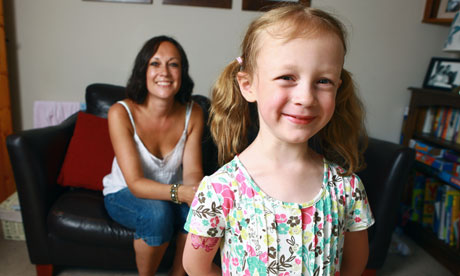
Alice is a child who is seen and not heard. The four-year-old is the easiest pupil to manage in her nursery, but while this quietness may seem like a blessing, it is causing her family serious worry. "Alice is no trouble to her teachers," says her mother, Kay Rippin. "The only problem is, she doesn't talk to anyone – not them, and not the other children either."
Alice has selective mutism – she doesn't speak, except to close family and friends. It's a complex and much misunderstood condition that is, at root, about extreme anxiety. Kay didn't realise anything was wrong with Alice – who had always been bright and chatty at home – until a teacher mentioned the little girl wasn't saying a word to anyone. "I was shocked – but I went home and looked the condition up, and realised that it's a form of phobia," says Kay. "Alice has always been shy – she'd look away when strangers said hello, for example – and now this anxiety had become a fully fledged phobia which meant she literally couldn't make her voice work in front of anyone she didn't know and trust really well."
According to Maggie Johnson, a Kent-based speech and language therapist and one of the few members of her profession to specialise in treating children with selective mutism, the condition is poorly understood, not only among the general public but also among professional health workers. "For a long time it was thought that these children were choosing not to speak, but in fact it's an inability to speak caused by anxiety – the vocal cords literally freeze up, and no words can come out.
"Children with the condition are almost always sensitive and wary of change – they tend to need a lot of reassurance. Their speech and language skills develop normally, but then often there's an incident which catches them unawares – it can be a very ordinary event, like waking up and finding there's a babysitter in charge, or it might be something that happens at nursery school. They associate speaking to strangers with a feeling of total panic, so begin to avoid situations in which they'd have to speak to strangers," says Johnson.
The condition can be debilitating; preventing children from interacting normally and from learning normally at school. If left untreated it tends to get worse. Simon Wainwright knows this only too well. His 13-year-old daughter, Catherine, has been seriously affected by her mutism. "She can't talk to anyone except her immediate family and one or two very close friends," he says. "So even though she's at secondary school she can't travel there independently and her life is likely to be more and more curtailed by her inability to communicate."
Catherine's problems were obvious from around the age of three, but Simon says he found it extremely difficult to find anyone to treat her. "We waited over a year for a referral, and then we were just passed from agency to agency as Catherine's condition worsened. I contacted a health visitor and got put in touch with the speech and language service – only to be told that they didn't 'do' selective mutism."
Yet Johnson says "there are lots of simple things you can do to take the fear out of the situation for younger children, and that can gradually wean them off their phobia. The most important thing is to stop putting them in situations where they have to talk – it's like putting a child who's terrified of the dark into a pitch-black room."
Treating older children with selective mutism is often thought to be harder because their phobic behaviour is more ingrained: but, says Johnson, it's not impossible for them to "unlearn" their fears, and begin to speak again. "I work with a lot of teens. The problem often is that they're seen as just pesky adolescents, acting up, when in fact it's a real problem. But the solution lies in convincing them that the anxiety doesn't have to control them – they can control the anxiety." The first step is to back off completely to "take away the fear and stress around talking".
Alice is now seeing an educational psychologist – although Kay would like her to see a specialist speech and language therapist and is worried about how she will cope when she starts school. But Johnson stresses selective mutism can be just a short phase in a child's life. "No child has to grow up with this condition. The sad thing is that those who don't get help and do grow up with it will need a lot of support from the mental health services, whereas if the support was there at an early age it could be just a childhood phase."

